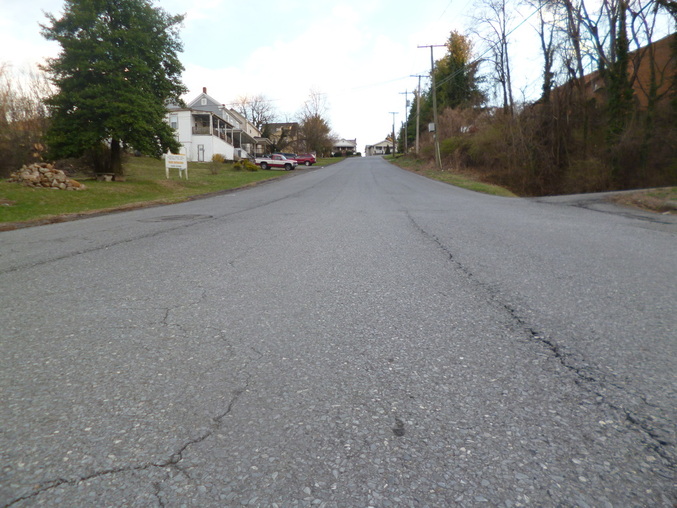On St. Patrick's Day weekend, I ran my first 5K race in several months. It was a brisk, windy morning in Roanoke, and I was admittedly out of shape. At about the two mile mark, I was beginning to feel the results of my lack of consistent exercise this winter. I was chugging along in the middle of the pack as we approached our first uphill climb. It was then, I noticed something interesting: As the runners ahead of me approached the hill, there heads immediately dropped. Their shoulders sagged a little in anticipation of the grueling ascent ahead of them. Since writing the book and starting the blog, I find myself more aware of moments like this. I tried to shake off my feelings of fatigue and decided that I now had an opportunity to make a move. I would use the uphill to my advantage.
In Honduras, as documented in the book, Cristina and I faced plenty of uphill battles. There were many times when failure seemed certain. Perhaps our biggest enemy to success was time. We had two years to accomplish our goals. We spent the first year adapting to our new culture, learning the language, and ultimately identifying the areas where we could possibly defy the odds. The second year was spent implementing the plan and working diligently with an inspiring group of youngsters. Ultimately, we achieved more than we ever imagined.
I often wonder how much more successful I could be in my own life if I approached every uphill battle like Cristina and I did in El Paraíso. What if I treated the seemingly most insurmountable task as if I had only a month, a year, three years to complete it?
In 2010, my wife and I made the decision that we no longer wanted our daughters in day care. Confronted with the reality that we needed a second salary to make ends meet, I decided to start my own business that could be operated from home in the evenings. This would enable me to be home with the girls during the day. We had about eight to twelve months of savings to pull from before my business needed to be making enough money to keep our family financially sound. It was a daunting task, and I was scared to death. Motivated by the desire to have our girls at home and driven to ensure that our decision would not lead to financial ruin, I poured every ounce of energy I had into the business. Cristina and I worked together in the evenings, never letting the idea of failure diminish our pursuits. Within six months, my business was thriving.
I wish I could tell you more stories like this. In reality, I cannot. I spend too much time complaining, blaming other people or circumstances for my unhappiness or lack of success. The race, the observation of the effect the hill had on those in front of me, was revealing. Recently, that's how I've been approaching the hills in my life. It's a reality I need to change. I like this article, and the author's ten ways to become more resilient as a place to start.
I finished 43rd in the race. It was an unspectacular finish, but I did make up some ground on the uphill stretch. In my life, I've found the most success in such situations. I believe that's probably true for most of us. When faced with a difficult situation, we have a choice: We can either put down our heads, sag our shoulders and prepare to fail, or we can look at the hill and tell ourselves, "This is where I thrive."
In Honduras, as documented in the book, Cristina and I faced plenty of uphill battles. There were many times when failure seemed certain. Perhaps our biggest enemy to success was time. We had two years to accomplish our goals. We spent the first year adapting to our new culture, learning the language, and ultimately identifying the areas where we could possibly defy the odds. The second year was spent implementing the plan and working diligently with an inspiring group of youngsters. Ultimately, we achieved more than we ever imagined.
I often wonder how much more successful I could be in my own life if I approached every uphill battle like Cristina and I did in El Paraíso. What if I treated the seemingly most insurmountable task as if I had only a month, a year, three years to complete it?
In 2010, my wife and I made the decision that we no longer wanted our daughters in day care. Confronted with the reality that we needed a second salary to make ends meet, I decided to start my own business that could be operated from home in the evenings. This would enable me to be home with the girls during the day. We had about eight to twelve months of savings to pull from before my business needed to be making enough money to keep our family financially sound. It was a daunting task, and I was scared to death. Motivated by the desire to have our girls at home and driven to ensure that our decision would not lead to financial ruin, I poured every ounce of energy I had into the business. Cristina and I worked together in the evenings, never letting the idea of failure diminish our pursuits. Within six months, my business was thriving.
I wish I could tell you more stories like this. In reality, I cannot. I spend too much time complaining, blaming other people or circumstances for my unhappiness or lack of success. The race, the observation of the effect the hill had on those in front of me, was revealing. Recently, that's how I've been approaching the hills in my life. It's a reality I need to change. I like this article, and the author's ten ways to become more resilient as a place to start.
I finished 43rd in the race. It was an unspectacular finish, but I did make up some ground on the uphill stretch. In my life, I've found the most success in such situations. I believe that's probably true for most of us. When faced with a difficult situation, we have a choice: We can either put down our heads, sag our shoulders and prepare to fail, or we can look at the hill and tell ourselves, "This is where I thrive."


 RSS Feed
RSS Feed